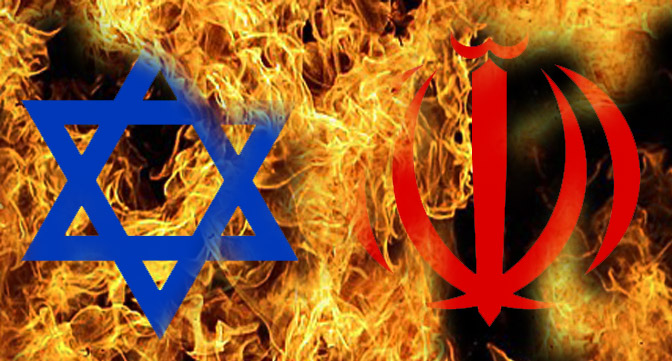On Friday morning 13th June, Israel launched an attack aimed at Iran’s nuclear capability, destroying key facilities and killing key military figures, among others.
Israeli Prime Minister Benjamin Netanyahu has made his agenda clear. – it’s to disarm Iran. The Iranian regime is sworn to Israel’s destruction. Despite its assurances that its nuclear programme is entirely peaceful, it is widely believed that its actual aim is to manufacture a bomb, and if it succeeded, the bomb would very likely be used on Israel.
It turns out that Israel had been planning this attack for a very long time, but it’s only now that its key ally the United States has given permission.
Iran has retaliated. The ‘shadow war’ which has been raging between the two countries, in which Israel has been fighting Iran’s proxies (Hamas, Hezbollah and the Houthis), appears to be erupting into a direct all-out war between these two major regional powers. The world watches in trepidation.
Past
So what’s the history of these two countries’ bitter rivalry? It’s a long and surprising one.
Iran is a relatively new name for an ancient nation – previously it was Persia. The Persian empire rose to prominence under Cyrus the Great in the 6th Century BC. Cyrus is celebrated by the Jews because he ordered their return to their land and the rebuilding of the Jerusalem temple in 539 BC, after their Babylonian exile. (The record is in the Bible in Ezra 1. It was prophesied 150 years earlier in Isaiah 45.)
A significant part of Bible history concerns the nation of Israel under the Persian empire. Generally it was a peaceful and prosperous time, and the Jews were treated well. The Jewish prophet Daniel was at the top of the Persian government during the reign of Cyrus (Daniel 6:28), and the Jewish queen Esther (whose story is in the book of her name) was married to Ahasuerus (probably Xerxes 1, who reigned in the early 5th Century BC).
History moved on. In 135 AD the Jewish nation was destroyed by the Romans and they were exiled again. Jewish communities in Persia, as elsewhere, enjoyed times of tolerance and times of persecution. During the 20th Century the Persian regime was modernised and westernised under the last Shahs, Reza Khan and his son Mohammad Reza. Jews in Persia were treated well and the regime had a good relationship with the newly formed nation of Israel.
Present
Then came the Iranian Revolution in 1979. The new Islamic Republic of the Ayatollahs is implacably hostile to the state of Israel. It funds various ‘proxy armies’ in the Middle East such as Hamas in Gaza, Hezbollah in Lebanon and the Houthis in Yemen, whose principal aim is Israel’s destruction.
However, modern Iran is a country of contradictions. Many ordinary Iranians detest the country’s regime and what it stands for, and are well disposed to Jews and the nation of Israel. Whereas Jewish communities have been extinguished in most Arab countries, there remains a thriving Jewish community in Iran. Whilst publicly deploring Israel’s attacks and urging restraint, there is widespread hope both outside and inside Iran that Israel’s campaign succeeds in dismantling Iran’s nuclear programme and disabling the government’s war machinery.
fFuture
Will it succeed? One possible scenario is that this current conflict will topple the Islamic Republic and usher in a new more peaceful regime, which is ready to work with its neighbours and the international community. Another is that the conflict escalates and draws in Israel’s and Iran’s allies (among them the USA and Russia), leading to a third world war. We can only wait, and watch.
What we do know is what we’re told in Ezekiel 38-39. There will at some point be a period when Israel attains a measure of relative peace and security (38: 8). At that time they will be invaded by a multinational confederacy, headed by a northern superpower (vs. 2-4). Iran (Persia) will be part of this invading force (v. 5). God will intervene, and destroy the invading army (vs. 21-23).
This will be the time of the establishment of the Kingdom of God, following the return of Jesus Christ (compare Zechariah 12-14).
Ezekiel 39 describes the destruction of the invading force and the salvation of Israel, and it ends: ‘Then they shall know that I am the LORD their God, because I sent them into exile among the nations and then assembled them into their own land. I will leave none of them remaining among the nations anymore. And I will not hide my face anymore from them, when I pour out my Spirit upon the house of Israel, declares the Lord GOD’ (vs. 28-29). Currently, the nation of Israel does not know God. They are not a God-fearing nation, and they are not doing God’s will.
It’s when God Himself intervenes in world history that Israel, and its neighbours, and all the nations, will at last live in peace.
Chris Parkin


